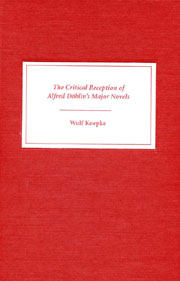Book contents
- Frontmatter
- Contents
- Preface
- Major Novels by Alfred Döblin
- Introduction
- Part One Contemporary Reviews
- Part Two Döblin Scholarship
- 3 Döblin Scholarship: The First Approaches
- 4 Die drei Sprünge des Wang-lun
- 5 Wadzeks Kampf mit der Dampfturbine
- 6 Wallenstein
- 7 Berge Meere und Giganten
- 8 Manas
- 9 Berlin Alexanderplatz
- 10 Babylonische Wandrung
- 11 Pardon wird nicht gegeben
- 12 Amazonas
- 13 November 1918
- 14 Hamlet oder Die lange Nacht nimmt ein Ende
- 15 Döblin's Impact on Other Writers
- Conclusion
- Bibliography
- Index
8 - Manas
from Part Two - Döblin Scholarship
Published online by Cambridge University Press: 05 February 2013
- Frontmatter
- Contents
- Preface
- Major Novels by Alfred Döblin
- Introduction
- Part One Contemporary Reviews
- Part Two Döblin Scholarship
- 3 Döblin Scholarship: The First Approaches
- 4 Die drei Sprünge des Wang-lun
- 5 Wadzeks Kampf mit der Dampfturbine
- 6 Wallenstein
- 7 Berge Meere und Giganten
- 8 Manas
- 9 Berlin Alexanderplatz
- 10 Babylonische Wandrung
- 11 Pardon wird nicht gegeben
- 12 Amazonas
- 13 November 1918
- 14 Hamlet oder Die lange Nacht nimmt ein Ende
- 15 Döblin's Impact on Other Writers
- Conclusion
- Bibliography
- Index
Summary
ONE OF THE LARGELY UNEXPLAINED RIDDLES of Döblin's oeuvre is his attempt to write a verse epic on a topic from ancient Indian mythology at a time when he was closely involved in the political struggles of the Weimar Republic and in the happenings of the literary scene of Berlin. Döblin did not help matters by declaring Manas a mere prelude to Berlin Alexanderplatz. In spite of Robert Musil's enthusiastic review at the time of its publication, Manas never found an audience, and is rarely seen by critics as a work in itself, but instead only as a transition to the real event, which is Berlin Alexanderplatz.
Despite the passage of time, Heinz Graber's 1967 study of Manas still stands out as a careful analysis of the text, based on the thesis of a circular movement of the text that progresses in order to reach the past. Reminding the reader of Expressionist works dealing with “der neue Mensch,” Döblin's character Manas needs to die to be reborn to a new existence as a demigod. This transformation and rebirth is the work of his beloved wife Sawitri, the incarnation of a new type of woman in Döblin's oeuvre beginning with Venaska in Berge Meere und Giganten, the woman who stands for redemption, for transformation, for the guide to a higher existence — variations of whom reappear in all subsequent texts, although their functions vary considerably.
- Type
- Chapter
- Information
- The Critical Reception of Alfred Döblin's Major Novels , pp. 123 - 125Publisher: Boydell & BrewerPrint publication year: 2003



